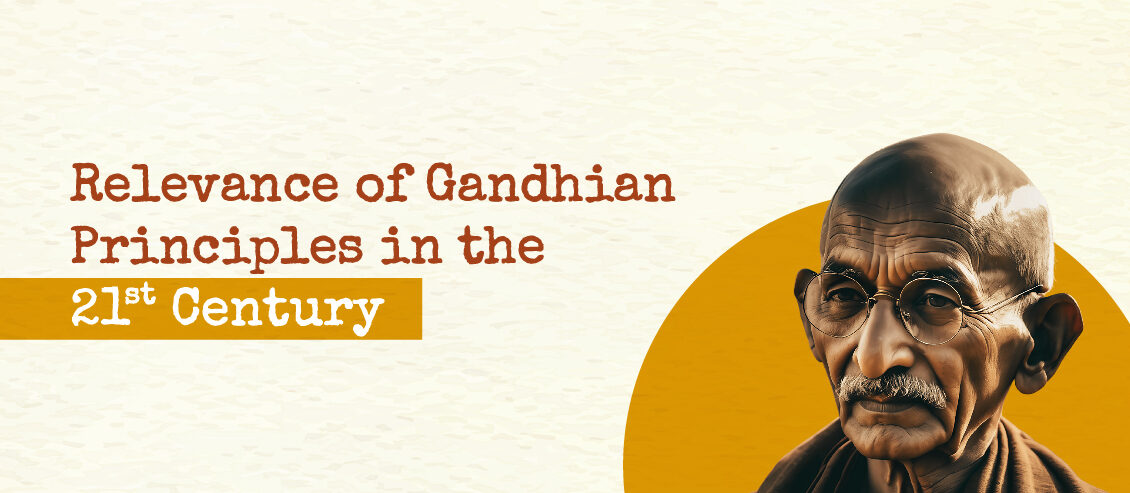Mahatma Gandhi’s philosophy continues to have a profound impact on modern society, offering valuable insights into addressing the complex challenges we face today. His ideas on non-violence, truthfulness, simplicity, self-reliance, and compassion remain remarkably relevant in today’s world.
Key Principles of Gandhian Philosophy
– Non-Violence (Ahimsa): Gandhi’s commitment to non-violence extends beyond physical harm to avoiding emotional, psychological, and societal violence. This principle emphasizes resolving conflicts through dialogue and understanding rather than aggression. In today’s world, Ahimsa can be applied by promoting respectful discourse and fostering positive online interactions.
– Truthfulness (Satya): Truthfulness forms the bedrock of Gandhian philosophy. Embracing honesty and transparency in our personal and public lives can help build trust and promote genuine dialogue. This principle is particularly relevant in the era of disinformation and fake news, where media literacy education and critical thinking are essential.
– Simplicity (Simplicity): Gandhi’s advocacy for simplicity reminds us to live with fewer possessions and a smaller ecological footprint, reducing stress and promoting meaningful experiences. This principle finds resonance in the global movement towards sustainable living, from reducing single-use plastics to downsizing living spaces.
– Self-Reliance (Swaraj): Gandhi’s concept of self-reliance emphasizes the importance of local production and community empowerment. In today’s globalized world, this principle can be applied by encouraging local entrepreneurship and supporting small businesses.
– Compassion and Service (Seva): Gandhi’s emphasis on serving others reminds us that our actions have far-reaching consequences. By engaging in acts of kindness and service, we can transform both ourselves and society, fostering empathy and unity.
Relevance in Modern Times
Gandhian philosophy offers valuable insights into addressing pressing global challenges, including:
– Climate Change and Sustainability: Gandhi’s emphasis on living in harmony with nature and minimizing consumption provides a framework for sustainable development. His quote, “Earth provides enough for every man’s need but not for every man’s greed,” is particularly relevant today.
– Social Justice and Equality: Gandhi’s commitment to social justice and equality remains essential in today’s world, where social inequality and division persist. His philosophy encourages individuals to take a proactive role in addressing social issues and promoting justice and equality.
– Peace and Stability: Gandhi’s philosophy of non-violence offers a powerful counter-narrative to extremism and terrorism. By promoting peace and stability, we can create a more just and compassionate world.
Impact on Policy and Development
Gandhian philosophy has influenced policy and development initiatives in India and globally. For example:
– Rural Development Schemes: Programs like MGNREGA and Pradhan Mantri Gram Sadak Yojana reflect Gandhi’s emphasis on rural empowerment and self-reliance.
– Sustainable Development: Initiatives like the Swachh Bharat Abhiyan and Ayushman Bharat demonstrate the relevance of Gandhi’s ideas on cleanliness, health, and sustainability.
– Education and Skill Development: Programs like Sarva Shiksha Abhiyan and Skill India reflect Gandhi’s commitment to education and self-reliance.
Conclusion
Gandhian philosophy remains remarkably relevant in today’s world, offering valuable insights into addressing complex challenges. By embracing its principles of non-violence, truthfulness, simplicity, self-reliance, and compassion, we can create a more just, peaceful, and sustainable world. As we navigate the complexities of the 21st century, Gandhi’s ideas continue to inspire and guide us towards a brighter future.
By – Debi Prasad










